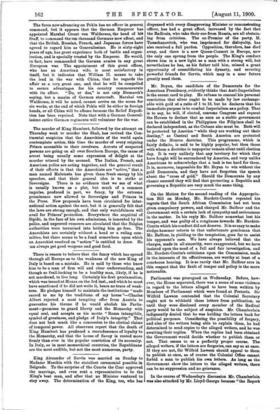There is reason to believe that the fancy which has
spread through all Europe as to the weakness of the new King of Italy is based on a mistake. He is said by those who know him to be a man of firm will and clear understanding, and though so frail-looking to be a healthy man, likely, if he is not murdered, to live long. Certainly his first proclamation, which was issued at Monza on the 3rd inst., and which he must have sanctioned if he did not write it, bears no trace of weak- ness. He pledges himself to maintain the institutions "made sacred to me by the traditions of my house "—Charles Albert rejected a most tempting offer from Austria to guarantee his throne if he would abolish his Parlia- ment—promises to guard liberty and the Monarchy with equal zeal, and accepts as his motto "Roma intangibile, symbol of greatness, and pledge of Italy's integrity." That does not look much like a concession to the clerical claims of temporal power. All observers report that the death of King Humbert has produced a recrudescence of loyalty to the Monarchy, and that the house of Savoy is rooted more firmly than ever in the popular conviction of its necessity. In Italy, as in most monarchical countries, the Republicans are the most audible, but not the most numerous, party.


































 Previous page
Previous page